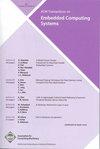一种用于电压标度电路的鲁棒高能效超维计算系统
IF 2.6
3区 计算机科学
Q2 COMPUTER SCIENCE, HARDWARE & ARCHITECTURE
引用次数: 0
摘要
电压缩放是提高能效最有希望的方法之一,但也给现代超大规模集成电路的稳定运行带来了挑战。为了解决这些问题,我们进一步将DependableHD扩展到第二个版本DependableHDv2,这是一个超维计算(HDC)系统,可以在低电压区域以高鲁棒性容忍位级内存故障。DependableHDv2引入了边际增强的概念用于模型再训练,并利用噪声注入来提高鲁棒性,这能够应用于大多数最先进的HDC算法。此外,我们还提出了一种尺寸交换技术,该技术旨在处理存储单元中由电压缩放引起的卡在错误。我们的实验表明,在8%的内存卡错情况下,DependableHDv2的平均精度损失为2.42%,与基线HDC解决方案相比,鲁棒性提高了14.1倍。硬件评估表明,DependableHDv2支持系统将项目存储器和联想存储器的供电电压从430mV降低到340mV,在保持具有竞争力的精度性能的同时,降低41.8%的能耗。本文章由计算机程序翻译,如有差异,请以英文原文为准。
A Robust and Energy Efficient Hyperdimensional Computing System for Voltage-scaled Circuits
Voltage scaling is one of the most promising approaches for energy efficiency improvement but also brings challenges to fully guaranteeing stable operation in modern VLSI. To tackle such issues, we further extend the DependableHD to the second version DependableHDv2 , a HyperDimensional Computing (HDC) system that can tolerate bit-level memory failure in the low voltage region with high robustness. DependableHDv2 introduces the concept of margin enhancement for model retraining and utilizes noise injection to improve the robustness, which is capable of application in most state-of-the-art HDC algorithms. We additionally propose the dimension-swapping technique, which aims at handling the stuck-at errors induced by aggressive voltage scaling in the memory cells. Our experiment shows that under 8% memory stuck-at error, DependableHDv2 exhibits a 2.42% accuracy loss on average, which achieves a 14.1 × robustness improvement compared to the baseline HDC solution. The hardware evaluation shows that DependableHDv2 supports the systems to reduce the supply voltage from 430mV to 340mV for both item Memory and Associative Memory, which provides a 41.8% energy consumption reduction while maintaining competitive accuracy performance.
求助全文
通过发布文献求助,成功后即可免费获取论文全文。
去求助
来源期刊

ACM Transactions on Embedded Computing Systems
工程技术-计算机:软件工程
CiteScore
3.70
自引率
0.00%
发文量
138
审稿时长
6 months
期刊介绍:
The design of embedded computing systems, both the software and hardware, increasingly relies on sophisticated algorithms, analytical models, and methodologies. ACM Transactions on Embedded Computing Systems (TECS) aims to present the leading work relating to the analysis, design, behavior, and experience with embedded computing systems.
 求助内容:
求助内容: 应助结果提醒方式:
应助结果提醒方式:


